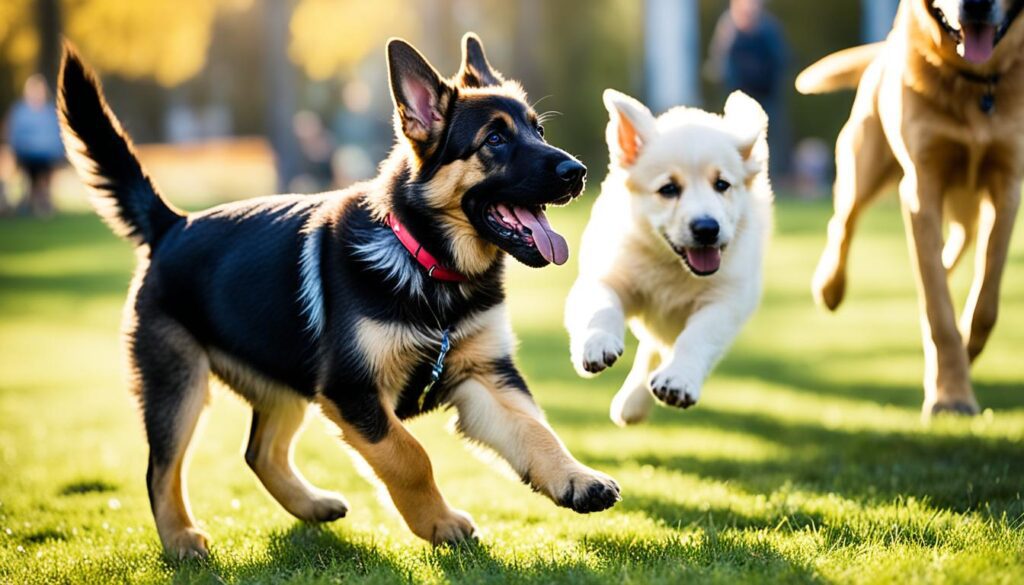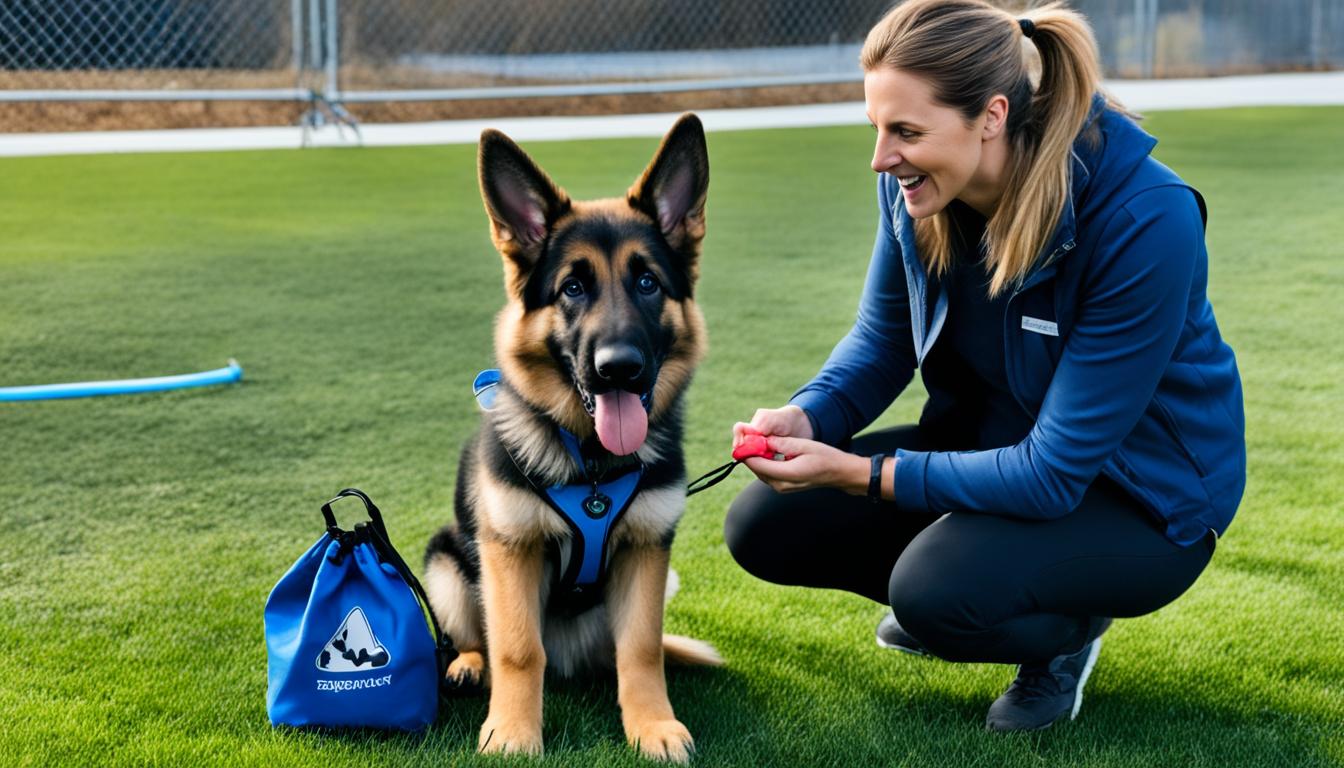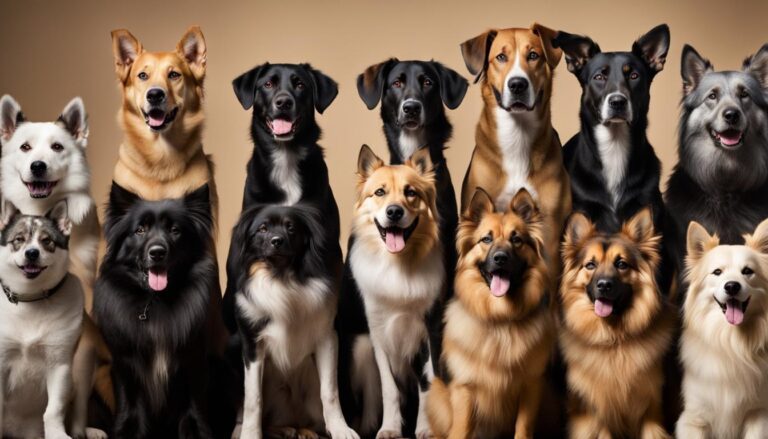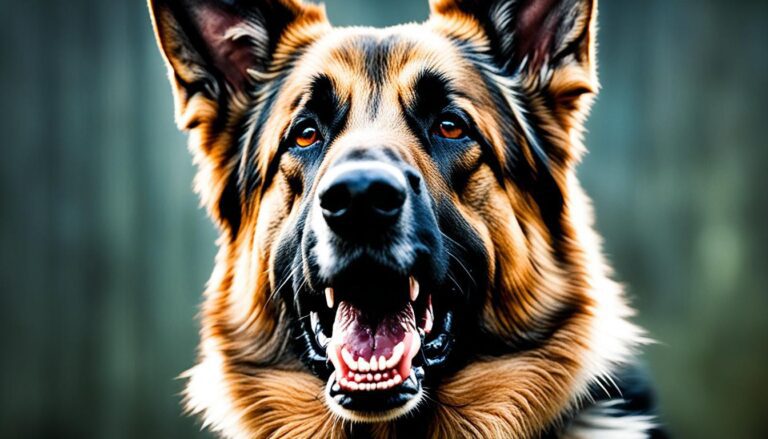Starting German Shepherd Training: Best Age Guide
Did you know that training a German Shepherd puppy should start as early as possible, preferably around 8 weeks old? That’s right – the sooner you begin training, the better. German Shepherds are highly intelligent and trainable, making them an ideal breed for training. But when is the best time to start, and what should you focus on during each stage of their development?
In this article, we will guide you through the appropriate age to begin training a German Shepherd and provide a comprehensive training timeline for your furry friend. From crate training and housetraining to basic obedience commands, we’ll cover it all to ensure you have the tools and knowledge needed to raise a well-mannered and obedient German Shepherd.
The Importance of Early Socialization for German Shepherds
German Shepherds are highly intelligent and loyal dogs, known for their protective nature and versatility in various roles, such as working dogs, family pets, and service animals. To ensure that your German Shepherd develops into a well-rounded and confident companion, early socialization is key.
Socializing a German Shepherd puppy plays a crucial role in their overall development and behavior. It helps them to differentiate between friendly and threatening individuals, reduces the risk of fear-based aggression, and enables them to adapt to new situations with ease.
The socialization window for German Shepherd puppies typically closes between 12 to 16 weeks of age. During this critical period, exposing them to a wide range of positive experiences is vital. This includes introducing them to different people, animals, and environments in a controlled manner.
When socializing a German Shepherd puppy, it’s important to expose them to various types of individuals, such as men, women, and children. They should also have positive interactions with people wearing hats or uniforms to prevent fear or aggression towards unfamiliar attire.
In addition to human interactions, it’s equally important to socialize German Shepherd puppies with other dogs. Well-behaved and friendly canine friends can help them develop appropriate social skills, learn to read canine body language, and enhance their overall confidence.
Moreover, exposing German Shepherds to different environments, sounds, and stimuli is crucial. This helps them become more adaptable, less prone to anxiety or fear, and well-prepared to handle new situations throughout their lives.
“Socializing a German Shepherd puppy is an ongoing process that requires dedication and consistency. By providing positive experiences and interactions during their formative months, you can help your German Shepherd become a well-socialized and confident companion.”
Remember, socialization is not just about exposing your German Shepherd to new experiences, but also about shaping their responses and ensuring that positive reinforcement is used consistently. By utilizing reward-based training methods, such as treats and praise, you can motivate and reinforce desired behaviors, establishing a strong foundation for their social development.

The Benefits of Early Socialization for German Shepherds:
- Promotes confidence and reduces fear-based aggression
- Helps differentiate between friendly and threatening individuals
- Enhances adaptability and reduces anxiety in new situations
- Improves social skills, including interaction with other dogs
- Creates a well-rounded and confident companion
To ensure your German Shepherd’s socialization is successful, take a gradual approach and introduce them to new experiences in a positive and controlled manner. Seek professional guidance if needed, and remember that socialization is an ongoing process that should continue throughout their lives.
Basic Training Commands for German Shepherd Puppies
Training a German Shepherd puppy is an important part of their development and overall wellbeing. Teaching them basic commands not only helps establish good behavior but also enhances the bond between you and your furry companion. Here are some essential training commands for German Shepherd puppies:
Sit
Training a German Shepherd to sit is one of the first commands you should teach them. This command is useful in various situations and helps them stay calm and focused. To train your German Shepherd to sit, follow these steps:
- Hold a treat close to their nose.
- Move your hand upwards, allowing their head to follow the treat and their bottom to lower.
- Once they are in a sitting position, praise them and reward them with the treat.
- Repeat this process several times a day until they can sit on command without the need for a treat.
Stay
Training a German Shepherd to stay is important for their safety and your peace of mind. This command helps prevent them from running off or getting into potentially dangerous situations. Here’s how you can train your German Shepherd to stay:
- Start with your German Shepherd in a sitting position.
- Hold your hand out and firmly say “stay” while taking a step back.
- If they stay in place, reward them with a treat and praise.
- If they try to follow you, gently guide them back to the original position and repeat the command.
- Practice this command in different environments and gradually increase the distance and duration of the stay.
Heel
Training a German Shepherd to heel is essential for enjoyable walks and outings. This command teaches them to walk calmly by your side without pulling on the leash. Follow these steps to train your German Shepherd to heel:
- Start with your German Shepherd on a leash.
- Hold the leash firmly and stand next to them.
- Begin walking and say “heel” firmly.
- If they start to pull or walk ahead, stop walking and make them sit.
- Resume walking and repeat the command until they walk calmly by your side.
- Remember to reward them with praise and treats when they exhibit the desired behavior.
Leash Training and Crate Training
Leash training and crate training are two crucial aspects of German Shepherd training that should be introduced early on. Leash training helps you maintain control during walks, while crate training provides your puppy with a safe and comfortable space. Here are some tips for leash training and crate training:
- Use a properly fitted collar or harness and a suitable leash for leash training.
- Allow your German Shepherd to become familiar with the equipment before starting training sessions.
- Start with short walks, gradually increasing the duration and distance as your puppy becomes more comfortable.
- For crate training, choose a crate that is large enough for your puppy to stand, turn around, and lie down comfortably.
- Make the crate a positive and welcoming space by using treats, toys, and blankets.
- Introduce your puppy to the crate gradually, using positive reinforcement and making it a part of their daily routine.
Potty Training
Potty training is an essential part of owning a German Shepherd puppy. Establishing a consistent routine and providing proper guidance will help them develop good bathroom habits. Here are some tips for German Shepherd potty training:
- Take your puppy outside frequently, especially after meals, naps, and playtime.
- Choose a designated potty area in your yard and take your puppy there every time you go outside.
- Use a cue word or phrase, such as “go potty,” to associate it with the desired behavior.
- When your puppy eliminates in the designated area, praise them and offer a reward.
- If accidents happen indoors, clean the area thoroughly and avoid punishment, as it can create anxiety or fear.
- Be patient and consistent, and with time, your German Shepherd will develop good potty habits.
Remember, training a German Shepherd is a gradual process that requires patience, consistency, and positive reinforcement. By teaching them these basic commands and providing proper guidance, you will set them up for a happy and well-behaved life.
Conclusion
Training a German Shepherd puppy is a rewarding journey that begins as early as possible, ideally around 8 weeks old. The breed’s high intelligence and trainability make them well-suited for training and obedience. Establishing good habits like crate training and housetraining from an early age sets a foundation for success.
Early socialization is vital for German Shepherds to develop confidence and differentiate between friendly and threatening individuals. Introducing them to various people, animals, and environments helps reduce the risk of fear-based aggression and promotes adaptability.
Teaching basic commands such as sit, stay, and heel should start from a young age. Positive reinforcement, consistency, and patience are essential training techniques. Leash training, crate training, and potty training play crucial roles in German Shepherd development.
Remember, training and reinforcing training throughout adolescence and adulthood is essential for the ongoing success of your German Shepherd. With the right approach, you can create a well-behaved and obedient companion that brings joy and fulfillment to your life.
FAQ
When should I start training my German Shepherd puppy?
Training a German Shepherd puppy should start as early as possible, preferably around 8 weeks old.
How do I find a German Shepherd puppy with the right temperament for training?
Finding a reputable breeder or rescue organization can help you find a puppy with the right temperament for training.
Why is socialization important for German Shepherd puppies?
Socialization is crucial for German Shepherd puppies, as it helps them develop confidence and learn how to interact with new people and situations.
What training should I start with during the puppy stage?
Crate training and housetraining should be started during the puppy stage to establish good habits.
At what age should I teach basic obedience commands to my German Shepherd puppy?
Basic obedience commands like sit, stay, and heel should be taught to German Shepherd puppies around 3 to 9 months old.
Is training only necessary during the puppy stage?
No, it’s important to continue training and reinforcing training throughout the puppy’s adolescence and into adulthood.
How do I motivate my German Shepherd during training?
Using positive reinforcement, such as treats and praise, can motivate and reinforce desired behaviors in German Shepherds.
What are the key factors for successful German Shepherd training?
Consistency, patience, and positive reinforcement are key to successful training with German Shepherds.
Why is early socialization important for German Shepherds?
German Shepherds have a natural protective instinct, so early socialization is crucial to ensure they can differentiate between friendly and threatening individuals.
When does the socialization window close for German Shepherd puppies?
The socialization window for German Shepherd puppies typically closes between 12 to 16 weeks of age.
How can I make sure my German Shepherd is well-socialized?
Exposing German Shepherd puppies to a variety of people, animals, and situations in a positive and controlled manner helps them develop confidence and reduces the risk of fear-based aggression.
Can other dogs help with the socialization of my German Shepherd puppy?
Introducing German Shepherd puppies to other well-behaved dogs can also help them learn proper canine social skills.
Why is exposure to different environments important in German Shepherd training?
Exposing German Shepherds to various environments, sounds, and stimuli helps them become more adaptable and less prone to anxiety or fear in new situations.
What are some basic commands I should teach my German Shepherd puppy?
German Shepherd puppies should be taught basic commands like sit, stay, and heel from a young age.
How should I reward my German Shepherd during training?
Positive reinforcement techniques, such as treats and praise, can be used to reward desired behaviors during training.
Why is leash training and crate training important for German Shepherds?
Leash training and crate training are important aspects of German Shepherd training, helping with obedience and providing a safe space for the puppy.
What is the key to successful potty training for German Shepherds?
Potty training for German Shepherds should be started early, and a consistent schedule and routine should be established.
How can training improve my German Shepherd’s behavior?
Teaching German Shepherds to walk calmly on a leash and respond to verbal cues can improve their overall behavior and obedience.
What are the key factors for successful German Shepherd training?
Consistency, patience, and positive reinforcement are key to successful training with German Shepherds.







